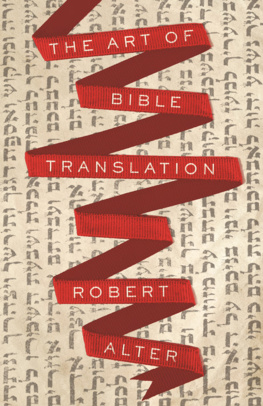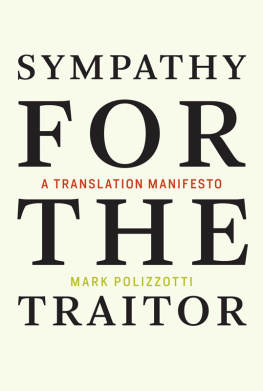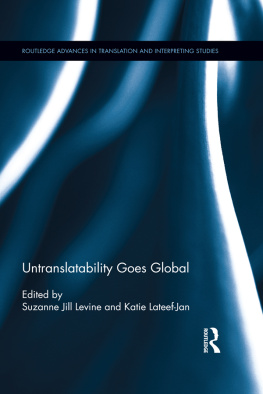THE ART OF TRANSLATION

First published in 2010 by Oberon Books Ltd.
This electronic edition first published in 2012
Oberon Books Ltd.
521 Caledonian Road, London N7 9RH
Tel: +44 (0) 20 7607 3637 / Fax: +44 (0) 20 7607 3629
e-mail: info@oberonbooks.com
www.oberonbooks.com
Copyright Ranjit Bolt, 2010
Ranjit Bolt is hereby identified as author of this work in accordance with section 77 of the Copyright, Designs and Patents Act 1988. The author has asserted his moral rights.
You may not copy, store, distribute, transmit, reproduce or otherwise make available this publication (or any part of it) in any form, or binding or by any means (print, electronic, digital, optical, mechanical, photocopying, recording or otherwise), without the prior written permission of the publisher. Any person who does any unauthorized act in relation to this publication may be liable to criminal prosecution and civil claims for damages.
A catalogue record for this book is available from the British Library
PB ISBN: 978-1-84002-865-2
EPUB ISBN: 978-1-84943-343-3
Visit www.oberonbooks.com to read more about all our books and to buy them. You will also find features, author interviews and news of any author events, and you can sign up for e-newsletters so that youre always first to hear about our new releases.
For Mum and Dad
Preface
T HIS BOOK DOES venture, occasionally, into highbrow territory (Dryden, Walter Benjamin, et al) but it is not intended to be a profoundly theoretical, intellectual analysis of the art of translation. Indeed, I would prefer to call it the business of translation, the more so as that is exactly what translation has been, for me, over the past twenty years or so a way of earning a living. These are, then, notes from the coalface the observations the accumulated (Gawd elp us) wisdom, of someone who, after a decade of safe, monthly remunerated employment, found himself suddenly cast, through a concatenation of good luck (Jonathan Millers doing my version of Le Menteur at the Old Vic) and lunacy, into the troubled waters of freelance translation a perilous field at the best of times, but I suspect never more perilous, precarious, than in the theatre.
I first began to think seriously about what it meant to be a translator after a temporary falling out with a close friend. It was all to do with status, I suppose, and ego. Not a nice admission to have to make. I was in the Groucho Club with a couple of friends and a young, attractive actress showed up, as young attractive actresses have a habit of doing at the Groucho Club, and during the course of conversation, during which I had been unaccustomedly silent, she turned to me and asked me what I did.
Now, as it happened, this was a question I had lately been asking myself. I had had something on at the National Theatre, a translation, I use the quotation marks advisedly well, the quotation marks are the whole point of this chapter, if not of this book; anyway, what Id had on was a version yes, lets call it a version, much safer word of Brechts awful play, perhaps the worst he ever wrote, The Resistible Rise Of Arturo Ui. Id made a creditable fist of this. In fact, Malcolm Rutherford, in the Financial Times, had hailed me as the translator as star and the novelist and critic Howard Jacobson had announced (on the BBC, so it had to be true) that the translator, Ranjit Bolt, is now a star in his own right.
The point of this trumpet-blowing is to highlight something about the role of the translator. Rutherfords remark evinced surprise, as who would say: Gosh! Heres a translator who makes one sit up and take notice of him!, while Jacobsons suggested that one can be a translator while at the same time being something more. The translator, of course, is the first person to want to believe this. When youre sitting in a prestigious theatre, watching one of your versions being performed, and a thousand odd people are laughing at regular intervals, the temptation one is only human, after all is to take credit for as much of the laughter as possible. After all, the thing is in English now in my case, often rhyming couplets, at that and the English, and the rhymes, are yours, not Molieres or Corneilles or whosoeer it be. Its a heady feeling that you get from that audience response, and its only human humanly arrogant, lets say to want to lay claim to as much of it as possible. If theres no such thing as translation, as sundry theorists would have us believe, then to some extent every translation is a re-writing, and every translator, for better or worse, a writer. But more of that anon, in Chapter Two to be precise, and back now to the Groucho Club.
So there I was, sipping my rioja, hastily debating with myself what answer I should give to this, as I say extremely sexy, young actress. Translator didnt feel to be the way to go. Bit of a passion-killer. In fact, I might as well have said chartered accountant. So I plumped for writer. Im a writer, I heard myself say out loud, and she seemed suitably impressed.
No youre not, said a voice to my right (a voice belonging to the aforementioned close friend), youre a translator.
I was livid. In the heat of wounded vanity I didnt speak to the guy for a week. He had trodden on my dreams, as Yeats would have put it, and shoved me rudely back into the dry, prosaic, transatorial box from which, for fifteen minutes, believing my own press, I thought Id escaped. Or he had if he was right. But was he? I think not.
As long as youre not translating a laundry list, or an Ikea assembly booklet, or something of that nature, its very hard, and probably not desirable, for a translator to be just that a flat, invisible renderer of meanings. In pretty much any other context, a translator is more than that, and that is something he, or she and we, the reader should embrace. The creative translator should not be rapped over the knuckles (as I have been on numerous occasions) for being too conspicuous. There is really no such thing as a good translation that is not, to a greater or lesser extent, creative. The tag creative translator is, in fact, a tautology, at any rate in the context of what is known as literary translation, and it is exclusively that genre that I shall be looking at in this study, as the title The Art of Translation obviously implies.
I question whether literary translators may actually lay claim to the exalted status accorded them by Walter Benjamin, in his essay The Task of the Translator (of which more later), but if anyone is in any doubt that we have at least some part to play, I would merely mention what happened to the late, great Simon Gray, when a production of a play of his was put on by a German theatre company. Half way through the performance a character entered covered from head to foot in an enormous orthopaedic cast. Simon turned, in bewilderment, to the director, who was sitting next to him, and asked him what the Hell was going on. (Presumably, he imagined, this was some sort of surreal, Teutonic flourish.) But it says in the text, the director replied, that this character is completely plastered throughout the scene.
1. Vive LImpossibilit!
I N THE PAST , when I was asked to write (for talks, programme notes, etc.) about the art of literary translation, I would employ the metaphor of a leaky pitcher. Translating, I maintained, was like taking a leaky pitcher (the target language) to a well (the original text, the host language) and trying to transport water (the original meaning, or content) in it to a bath or basin (the speakers and readers of the target language, or audiences, in my case). It was a better analogy than I at first realised, because of course the word translation, coming, as it does, from the Latin word transfero actually contains within it the idea of carrying something across from one place, language, to another.
Next page







